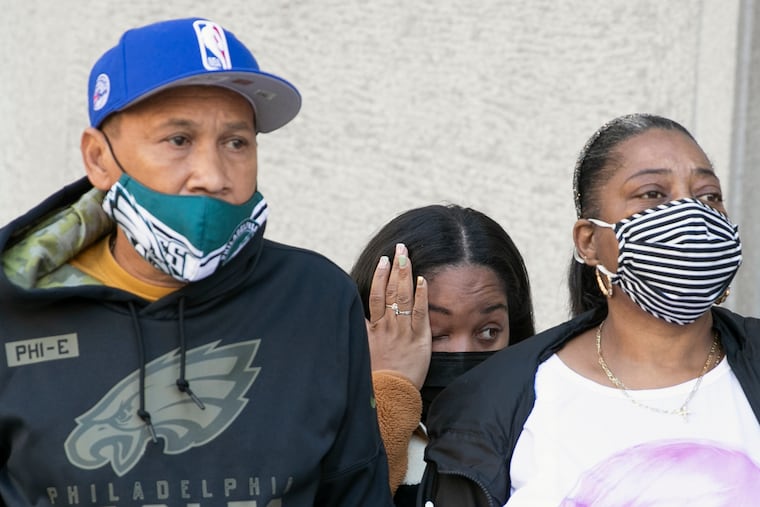Philly to pay $2.5 million to Walter Wallace Jr.’s family to settle claims over his killing by police
The settlement came two days after city officials agreed to equip patrol officers with Tasers, a demand the family made shortly after Wallace was fatally shot by two officers who did not have them.

The city of Philadelphia has agreed to pay $2.5 million to the family of Walter Wallace Jr. to settle a wrongful-death lawsuit filed after Wallace was killed by police in October of last year, touching off days of protest and unrest.
The settlement came two days after city officials agreed to equip all patrol officers with Tasers — a demand the family made shortly after Wallace, in the throes of a mental breakdown and holding a knife, was fatally shot by two officers who did not have the nonlethal weapons.
Lawyers for the Wallace family, Shaka Johnson and Kevin O’Brien, declined to say how much the city agreed to pay to settle the suit, saying the family wanted privacy. But city officials confirmed the sum.
At a news conference Thursday afternoon, Johnson said the settlement “reflected the tragedy that took place, the city’s role and policy failures that contributed to [Wallace’s] death, while also taking into account the factual complexities” of the case.
Sources familiar with the case told The Inquirer the settlement is the largest the city had ever paid in the case of an armed person killed by police. In 2018, the city paid $1 million to the family of David Jones, who was fatally shot by a police officer who stopped him for riding a dirt bike on the sidewalk. Jones had a gun, authorities said, but it fell to the ground and he was running away when Officer Ryan Pownall shot him. Pownall was charged with murder and is awaiting trial.
In Wallace’s case, Mayor Kenney said in a statement that he hoped that the settlement “brings some measure of closure for the family.”
Wallace, 27, was fatally shot by Officers Sean Matarazzo and Thomas Munz Jr. after he approached them while holding a knife. After telling him to drop the weapon 23 times, the officers fired a volley of 14 bullets. Wallace died in front of his parents’ home in the 6100 block of Locust Street.
The officers went to the home after Wallace’s relatives called 911 and told a dispatcher that he had become violent during a mental episode.
Wallace was an aspiring rapper and a father of nine with a daughter due days after his death, and had a history of battles with mental health and a criminal record. His killing sparked protests in his neighborhood and across the city as people denounced the use of police force against him. His family and others questioned why nonlethal options like Tasers or shooting to wound weren’t used, why more attention wasn’t paid to his history of mental illness, and whether racial bias might have played a role in the shooting. Wallace was Black. The officers who shot him — Munz, 27, and Matarazzo, 26 — are white.
City Councilmember Jamie Gauthier, who represents the West Philadelphia community where Wallace was killed, said that while the city has expanded services for people with mental health issues in recent months, more is needed.
“If there were equity and justice in our system, we would not have police responding to mental health calls,” she said. “The reality is that we need loving, supporting systems in this city.”
Gauthier thanked Wallace’s father, whose name is also Walter Wallace Jr., and his mother, Kathy Brant, for their advocacy in the midst of their grief, as they pushed the city to agree to provide all patrol officers with Tasers.
“They gathered the strength to fight for changes to prevent other families from going through the same ordeal that they did,” she said. “Today I am glad we can stand together and say, progress is being made in Walter’s name and in his memory.”
Wallace’s father said he was pleased with the settlement and hoped the expanded use of Tasers would save lives.
“If this situation can save anybody’s life, out of so many thousands of lives, I think we accomplished something,” he said. “I want to thank everyone who prayed for me and my family.”